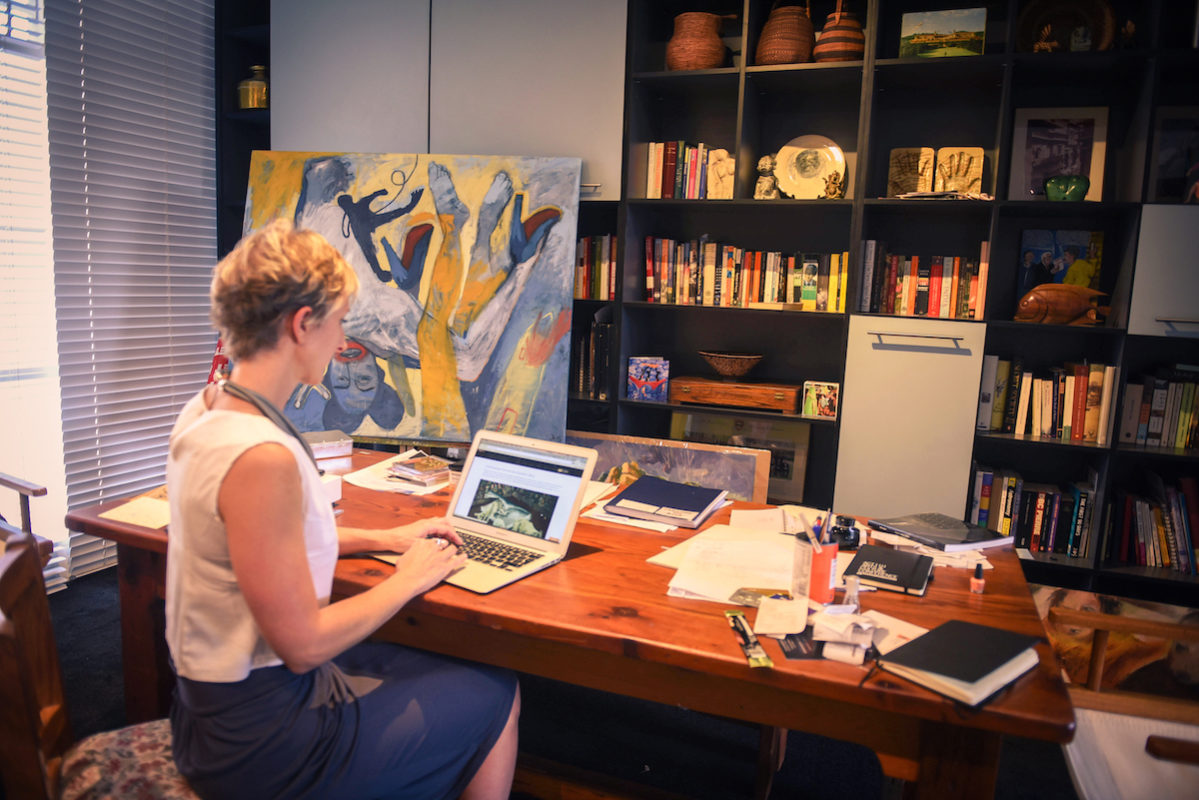Pursue your dreams but do so in a realistic way.
Maybe you’ve been thinking about starting your own business for a while, but you need a little nudge in the right direction to make the leap from corporate to business. Or maybe you’ve already made the leap and feel a little lost and overwhelmed.
Starting a business can be scary, but we’re here to help make it easier for you.
To do that, we chatted to Julie Taylor. She worked for a large corporation as the Head of Communications in sub-Saharan Africa. She was successful and content, but there was an itch that corporate life couldn’t scratch.
She saw a gap and took a leap, leaving the security of her job to start her own business. Guns & Rain is a curated online gallery of contemporary fine art from southern Africa.
Watch this short video to get insight into Julie’s journey. And read on below for more great advice on making the jump into entrepreneurship.

Understand the real reason and motivation for starting a business
Julie’s job involved travel. She was exposed to a lot of beautiful art created by people with no support. These struggling artists needed a platform to showcase their skills. With her background in Communications – and a burning passion for art – Julie was in a position to help give them a voice.
When you’re seriously considering starting a small business, ask yourself how much you really care. Whose needs are you serving? What gap are you filling? Will you have enough energy and passion to keep the fire burning when things get tough?
If your motivation to start your own business because you don’t like your boss, you may want to reconsider. Be clear about your reasons and intentions – especially with yourself.
Speak to people you trust
It’s important to speak to other entrepreneurs. They know the highs and lows of what it means to start something from scratch – on your own.
Getting advice from other people does two important things for you.
Firstly, it forces you to contextualise your ideas. You’d be surprised at how often things can make sense in your head, but sound confusing to others who don’t have context. If you can sell your business idea clearly over a quick chat, you’re in a good place.
Secondly, it’s an opportunity to get honest feedback.
Someone could highlight weaknesses in your plan. Or share insight into the landscape of the industry’s landscape. And even inspire you with ideas to build on your vision!
That said, it’s important to be cautious. Everyone has an opinion, and not all of them are constructive. Be sure to do your homework before making any big moves. Research, collect information, crunch the numbers and then make an informed decision.
Ideas are great but you must get everything down on paper. Once you’ve brought it all together, ask yourself if your idea still works
Research, then scrutinise your business plan
Putting your business plan on paper is the first step to making it real. Once you’ve got the basic idea sketched out, think about the obstacles and uncertainties. What could get in the way?
For Julie, it was important to answer the following questions before she made the decision to leave her job:
- Will people be willing to purchase art online if they haven’t seen it in real life?
- What’s the best way to display art online to ensure it’s appealing enough to lead to a sale?
- Will artists be interested and willing to get involved in this project? What could hinder their involvement?
- How will I make enough money to live until my business starts doing well?
In general, key areas to research are:
- Target audience: Who are they, where are they, how big is the market, and what’s the best way to reach them?
- Financial projections: How much will it cost to get things off the ground? What are the ongoing operational costs?
- Capabilities: Do you have the required skills or a plan for how to acquire these skills?
- Commitment: Can I guarantee a long-term commitment to this business – despite all challenges?
Be open to learning and stay curious
Some people are natural learners. Others aren’t and have to make a conscious decision to open themselves to learning.
Julie’s career exposed her anthropology, writing, corporate communications and more. All equipped her with the skills she needed to explore entrepreneurship. Along the way, she learnt that you need to stay a keen learner – despite the fact that it gets harder as you get older.
You need to be passionate about learning. First hand and through others. Embrace change and challenges. Being willing and able to adapt will help you thrive as the owner of your own business.
Maintain an income stream independent of your new business
Watching your savings run out is stressful. Especially while you’re still trying to get a business off the ground. It could lead you to make rash decisions, like pushing a product out before it’s ready because you’re desperate for the income.
For this reason, it’s best to start your business as a side project. Dedicate what time you can to it outside of work hours. One day, it will need more time than you can give it while keeping your day job.
And when you decide to quit your job to pursue life as an entrepreneur, Julie recommends trying to keep a side job that you’re already qualified for or have experience in. Consulting or freelancing for a few hours a week creates a constant stream of income and relieves pressure. So you can focus on building your own empire and planning the leap from corporate to business!
Do you have any questions or concerns about starting your own business? Let us know in the comments below.



